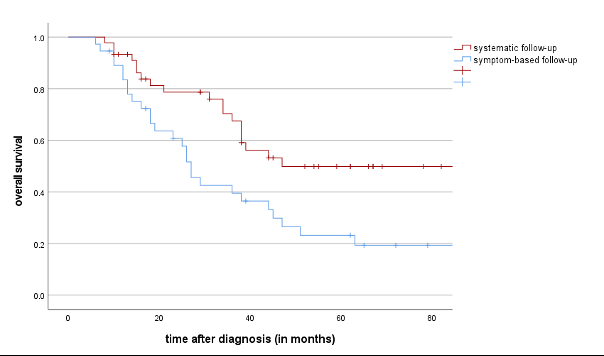Back to 2024 Abstracts
EFFECT OF SYSTEMATIC VERSUS SYMPTOM-BASED FOLLOW-UP AFTER DEFINITIVE RADIOCHEMOTHERAPY FOR ESOPHAGEAL CANCER ON SURVIVAL
Sarah Gerber
*, Reiner Wiest, Martin D. Berger, Hossein Hemmatazad, Dino Kröll, Tobias Haltmeier, Yves Borbély
Inselspital, Department of Visceral Surgery and Medicine, Universitat Bern Medizinische Fakultat, Bern, Bern, Switzerland
Background:
Organ-sparing therapy with definitive radio-chemotherapy (RCT) for esophageal cancer (EC) is gaining clinical importance. However, there is scarce data on the optimal follow-up strategy of such a watch&wait approach. It is unclear whether follow-up should consist of repetitive, scheduled endoscopies and radiologic evaluation (RE) or rather be symptom-based (SB). This study aims to compare the outcome of those two approaches.
Methods:
We conducted a retrospective analysis using prospectively recorded electronic medical data of all patients diagnosed with potentially curable EC and organ-sparing approach between 01/2014 – 12/2020. After RCT, patients with clinical complete response assessed by endoscopy, endosonography and thoracoabdominal computed tomography (CT), were followed-up either with RE or SB. The RE group underwent routine endoscopy every 3 months and CT every 6 months while the SB group had regular clinical visits but further evaluation with CT and endoscopy only if symptomatic.
Overall- (OS) and disease-free (DFS) survival were calculated using Kaplan-Meier survival analysis.
Results:
Of 83 patients with definitive RCT, 45 (54%) were in the RE- and 38 (46%) in the SB-group. There was no significant difference in demographic and tumor characteristics.
While no differences were observed in DFS, the RE group had significantly better OS (mean OS in RE 57.9 months (min 48.0 – max 67.8) in SB 39.7 months (29.2 – 50.1)). Recurrence occurred in 41 patients (49.4%, RE: 23 patients, SB: 18 patients). In the RE group, recurrence could be managed more frequently with curative intent (RE: 10 patients, SB: 2 patients), primarily due to tumor extent and patient's condition. Tumor stage at time of recurrence was significantly advanced in the SB group.
Conclusion: In patients undergoing an organ-sparing approach after RCT for EC, a structured follow-up with 3-monthly endoscopies and 6-monthly CT led to earlier diagnosis of recurrence with same disease-free but significantly better overall survival when compared to symptom-based follow-up.

Back to 2024 Abstracts
